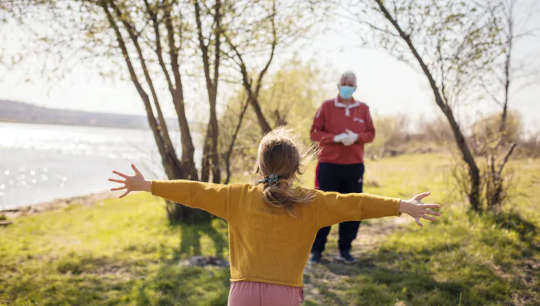 Our sense of touch is important for creating and maintaining social bonds. DimaBerlin/ Shutterstock
Our sense of touch is important for creating and maintaining social bonds. DimaBerlin/ Shutterstock
For many people, the thing they’ve missed most during the pandemic is being able to hug loved ones. Indeed, it wasn’t until we lost our ability to hug friends and family did many realise just how important touch is for many aspects of our health – including our mental health.
But now that vaccine programmes are being rolled out and restrictions are beginning to ease in much of the UK, many people will be keen to hug again. And the good news is that not only do hugs feel good – they also have many health benefits.
The reason hugs feel so good has to do with our sense of touch. It’s an extremely important sense which allows us not only to physically explore the world around us, but also to communicate with others by creating and maintaining social bonds.
Touch consists of two distinct systems. The first is “fast-touch”, a system of nerves which allows us to rapidly detect contact (for example, if a fly landed on your nose, or you touched something hot). The second system is “slow-touch”. This is a population of recently discovered nerves, called c-tactile afferents, which process the emotional meaning of touch.
These c-tactile afferents have essentially evolved to be “cuddle nerves” and are typically activated by a very specific kind of stimulation: a gentle, skin-temperature touch, the kind typical of a hug or caress. We see c-tactile afferents as the neural input stage in signalling the rewarding, pleasurable aspects of social tactile interactions such as hugging and touching.
Touch is the first sense to start working in the womb (around 14 weeks). From the moment we’re born, the gentle caress of a mother has multiple health benefits, such as lowering heart rate and promoting the growth of brain cell connections.
When someone hugs us, the stimulation of c-tactile afferents in our skin sends signals, via the spinal cord, to the brain’s emotion processing networks. This induces a cascade of neurochemical signals, which have proven health benefits. Some of the neurochemicals include the hormone oxytocin, which plays an important role in social bonding, slows down heart rate and reduces stress and anxiety levels. The release of endorphins in the brain’s reward pathways supports the immediate feelings of pleasure and wellbeing derived from a hug or caress
 Hugging releases many important neurochemicals. Mladen Zivkovic/ Shutterstock
Hugging releases many important neurochemicals. Mladen Zivkovic/ Shutterstock
Hugging has such a relaxing and calming effect that it also benefits our health in other ways.
It improves our sleep: From the benefits of co-sleeping with infants to cuddling your partner, gentle touch is known to regulate our sleep, as it lowers levels of the hormone cortisol. Cortisol is a key regulator of our sleep-wake cycle but also increases when we’re stressed. So it’s no wonder high levels of stress can delay sleep and cause fragmented sleep patterns or insomnia.
It reduces reactivity to stress: Beyond the immediate soothing and pleasurable feelings provided by a hug, social touch also has longer-term benefits to our health, making us less reactive to stress and building resilience.
Nurturing touch, during early developmental periods, produces higher levels of oxytocin receptors and lower levels of cortisol in brain regions that are vital for regulating emotions. Infants that receive high levels of nurturing contact grow up to be less reactive to stressors and show lower levels of anxiety.
Increases wellbeing and pleasure: Across our lifespan, social touch bonds us together and helps maintain our relationships. As noted, this is because it releases endorphins, which makes us see hugs and touch as rewarding. Touch provides the “glue” that holds us together, underpinning our physical and emotional wellbeing.
And when touch is desired, the benefits are shared by both people in the exchange. In fact, even stroking your pet can have benefits on health and wellbeing – with oxytocin levels increasing in both the pet and the owner.
It could help us fight off infections: Through regulation of our hormones – including oxytocin and cortisol – touching and hugging can also affect our body’s immune response. Whereas high levels of stress and anxiety can suppress our ability to fight infections, close, supportive relationships benefit health and well-being.
Research even suggests that cuddling in bed could protect us against the common cold. By monitoring hugging frequency among just over 400 adults who were then exposed to a common cold virus, researchers found the “huggers” won hands-down in being less likely to get a cold. And even if they did, they had less severe symptoms.
Hug it out
While it’s important we continue to keep ourselves safe, it’s equally as important that we don’t give up hugs forever. Social isolation and loneliness are known to increase our chances of premature death – and perhaps future research should investigate whether it’s a lack of hugs or social touch that may be driving this. Touch is an instinct that is all-around beneficial for our mental and physical health – so we should celebrate its return.
Of course, not everyone craves a hug. So for those that don’t, there’s no reason to worry about missing out on the benefits of hugs – as giving yourself a hug has also been shown to regulate emotional processes and reduce stress.![]()
About The Authors
Francis McGlone, Professor in Neuroscience, Liverpool John Moores University and Susannah Walker, Senior Lecturer, Natural Sciences & Psychology, Liverpool John Moores University

Related Books:
The Five Love Languages: The Secret to Love That Lasts
by Gary Chapman
This book explores the concept of "love languages," or the ways in which individuals give and receive love, and offers advice for building strong relationships based on mutual understanding and respect.
Click for more info or to order
The Seven Principles for Making Marriage Work: A Practical Guide from the Country's Foremost Relationship Expert
by John M. Gottman and Nan Silver
The authors, leading relationship experts, offer advice for building a successful marriage based on research and practice, including tips for communication, conflict resolution, and emotional connection.
Click for more info or to order
Come as You Are: The Surprising New Science that Will Transform Your Sex Life
by Emily Nagoski
This book explores the science of sexual desire and offers insights and strategies for enhancing sexual pleasure and connection in relationships.
Click for more info or to order
Attached: The New Science of Adult Attachment and How It Can Help You Find—and Keep—Love
by Amir Levine and Rachel Heller
This book explores the science of adult attachment and offers insights and strategies for building healthy and fulfilling relationships.
Click for more info or to order
The Relationship Cure: A 5 Step Guide to Strengthening Your Marriage, Family, and Friendships
by John M. Gottman
The author, a leading relationship expert, offers a 5-step guide for building stronger and more meaningful relationships with loved ones, based on principles of emotional connection and empathy.
Click for more info or to order
This article is republished from The Conversation under a Creative Commons license. Read the original article.





















